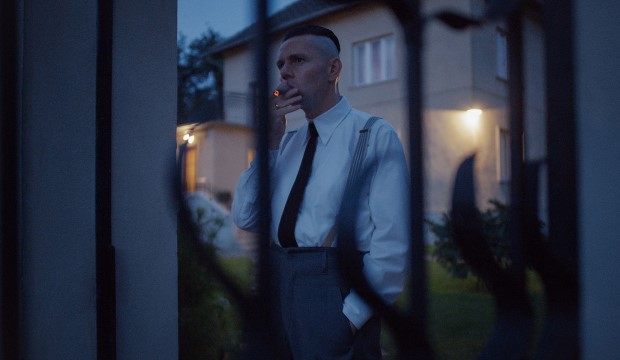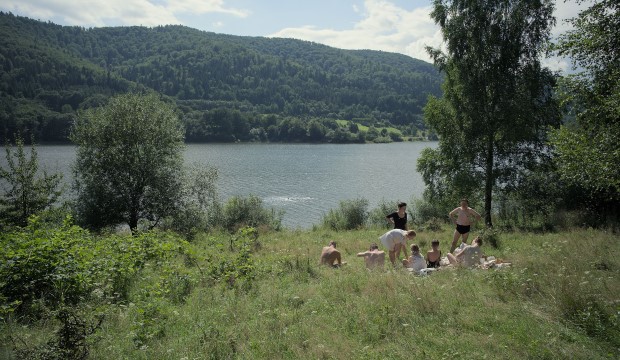The Zone of Interest review ★★★★★
After 10 years away, filmmaker Jonathan Glazer returns with a new and haunting holocaust film based on the Martin Amis novel. Stars Christian Heidel and Sandra Hüller
Sandra Hüller in The Zone of Interest (Photo: A24)
The Zone of Interest won the Grand Prix prize at the Cannes Film Festival 2023.
Imagine a house, two storeys high. It has a large garden, populated with sunflowers and vegetables. An ostensibly idyllic family lives there: father, mother, kids, a baby and a dog. If they weren’t speaking German, you might mistake the sight for picture-postcard American suburbia. And then: the father, Commandant Rudolf Höss (Christian Heidel), emerges in his Nazi uniform. Instead of a white picket fence, the property is bordered by a tall grey wall – beyond which stand the brick buildings of Auschwitz.
This is the tangible absurdity of Jonathan Glazer’s new film The Zone of Interest, loosely based on the 2014 novel by Martin Amis. The environment is almost Lynchian in its disparity: strolling across the threshold of the worst horror in human history. You can hear the screams and shouts of disorder. Kids play as gunshots snap in the distance. Smoke and flames erupt from a crematorium chimney, visible from the garden.
The film relaxes into this eerie liminal space that isn’t properly acknowledged by the characters, like a 100-minute act of amoral disassociation.

Christian Heidel as Rudolf Höss. Photo: A24
A few dramas poke through, chiefly Rudolf’s reassignment to Berlin. His wife Hedwig (a frosty and determined Sandra Hüller) is upset by her husband's news, firm about staying alongside the concentration camp. She's spent a long time making the house a home. Again: it’s another weird scene that shouldn’t belong in reality and yet does. She wants to stay, she needs to. Is she not bothered by the sounds and, undoubtedly, the smells of mass slaughter mere yards from her front door?
Glazer retains Amis's atmosphere of haunting nonchalance, but significantly diverts from the source material. The book examines three characters (two Nazi officers and a Sonderkommando), whereas the film selects the most extreme and returns that perspective to the reality from which it was inspired.
Rudolf Höss was a real commandant in Auschwitz (hanged in 1947), who oversaw the construction of gas chambers as well as the application of Zyklon B (the pesticide used to murder over one million people). In the film, his subordinate Nazi officers bring maps of these plans and describe their genocide in a bureaucratically mundane manner. But these scenes are few and far between; for the most part, you see him as a family man, an attentive provider.

Photo: A24
In the book's afterword, Amis cites the holocaust survivor Primo Levi who wrote: ‘Perhaps one cannot, what is more one must not, understand what happened, because to understand is almost to justify … They are non-human words and deeds, really counter-human.’ That state of unrecoverable non-understanding seeps into Lukas Zal’s distant cinematography, which consists of extended takes and few close-ups. The sets used a network of many cameras with Glazer and Zal observing from a different location.
Unfortunately, this distance can make The Zone of Interest into an exhausting watch as much as a disturbing one – empathy and connection barely exist here. What you’re left with is the despicable ambiguity of Rudolf, who at one stage retches on a desolate staircase. The scene reminds this critic of a similar throaty emesis in Joshua Oppenheimer’s unforgettable documentary The Act of Killing, about Indonesian death squads. It’s an evocative image: a mass murderer experiencing nausea, as if trace amounts of his soul are desperate to evacuate.
With The Zone of Interest, Glazer crafts a staggering piece of art; it’s like viewing a museum exhibit. And although it’s a struggle to sit through, the events continue to press into your mind, your heart and every aspect that makes you relieved to be human.
Reviewed at the London Film Festival 2023. The Zone of Interest will be in UK cinemas on Friday 2 February.
Imagine a house, two storeys high. It has a large garden, populated with sunflowers and vegetables. An ostensibly idyllic family lives there: father, mother, kids, a baby and a dog. If they weren’t speaking German, you might mistake the sight for picture-postcard American suburbia. And then: the father, Commandant Rudolf Höss (Christian Heidel), emerges in his Nazi uniform. Instead of a white picket fence, the property is bordered by a tall grey wall – beyond which stand the brick buildings of Auschwitz.
This is the tangible absurdity of Jonathan Glazer’s new film The Zone of Interest, loosely based on the 2014 novel by Martin Amis. The environment is almost Lynchian in its disparity: strolling across the threshold of the worst horror in human history. You can hear the screams and shouts of disorder. Kids play as gunshots snap in the distance. Smoke and flames erupt from a crematorium chimney, visible from the garden.
The film relaxes into this eerie liminal space that isn’t properly acknowledged by the characters, like a 100-minute act of amoral disassociation.

Christian Heidel as Rudolf Höss. Photo: A24
A few dramas poke through, chiefly Rudolf’s reassignment to Berlin. His wife Hedwig (a frosty and determined Sandra Hüller) is upset by her husband's news, firm about staying alongside the concentration camp. She's spent a long time making the house a home. Again: it’s another weird scene that shouldn’t belong in reality and yet does. She wants to stay, she needs to. Is she not bothered by the sounds and, undoubtedly, the smells of mass slaughter mere yards from her front door?
Glazer retains Amis's atmosphere of haunting nonchalance, but significantly diverts from the source material. The book examines three characters (two Nazi officers and a Sonderkommando), whereas the film selects the most extreme and returns that perspective to the reality from which it was inspired.
Rudolf Höss was a real commandant in Auschwitz (hanged in 1947), who oversaw the construction of gas chambers as well as the application of Zyklon B (the pesticide used to murder over one million people). In the film, his subordinate Nazi officers bring maps of these plans and describe their genocide in a bureaucratically mundane manner. But these scenes are few and far between; for the most part, you see him as a family man, an attentive provider.

Photo: A24
In the book's afterword, Amis cites the holocaust survivor Primo Levi who wrote: ‘Perhaps one cannot, what is more one must not, understand what happened, because to understand is almost to justify … They are non-human words and deeds, really counter-human.’ That state of unrecoverable non-understanding seeps into Lukas Zal’s distant cinematography, which consists of extended takes and few close-ups. The sets used a network of many cameras with Glazer and Zal observing from a different location.
Unfortunately, this distance can make The Zone of Interest into an exhausting watch as much as a disturbing one – empathy and connection barely exist here. What you’re left with is the despicable ambiguity of Rudolf, who at one stage retches on a desolate staircase. The scene reminds this critic of a similar throaty emesis in Joshua Oppenheimer’s unforgettable documentary The Act of Killing, about Indonesian death squads. It’s an evocative image: a mass murderer experiencing nausea, as if trace amounts of his soul are desperate to evacuate.
With The Zone of Interest, Glazer crafts a staggering piece of art; it’s like viewing a museum exhibit. And although it’s a struggle to sit through, the events continue to press into your mind, your heart and every aspect that makes you relieved to be human.
Reviewed at the London Film Festival 2023. The Zone of Interest will be in UK cinemas on Friday 2 February.
TRY CULTURE WHISPER
Receive free tickets & insider tips to unlock the best of London — direct to your inbox
| What | The Zone of Interest review |
| When |
02 Feb 24 – 02 Feb 25, IN CINEMAS |
| Price | £determined by cinemas |
| Website | Click here for more information |